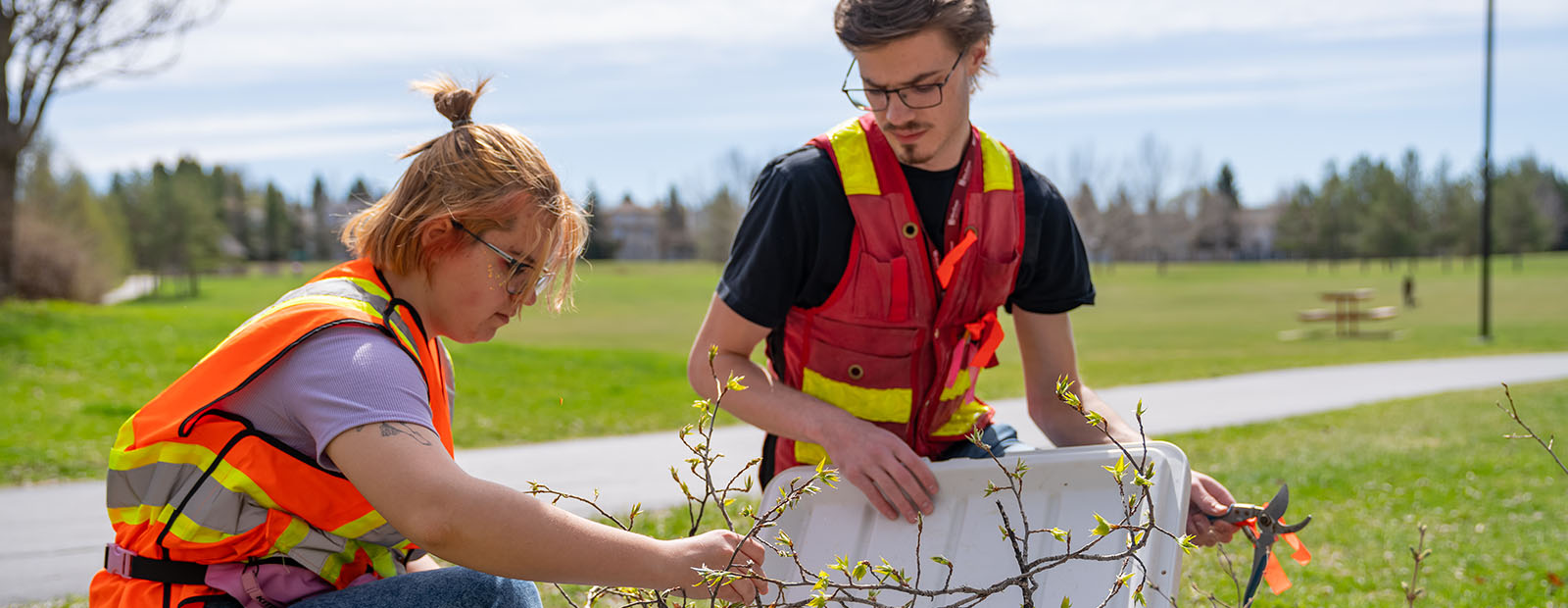Almost four years after Dr. Leah Flaherty’s students began collecting and testing samples of white clover along the Sturgeon River in St. Albert, findings from the international study they were contributing to appeared in the prestigious academic journal, Science.
Students in a BIOL 410 field research class co-taught by Dr. Flaherty and Dr. Karen Christensen-Dalsgaard, along with 260 other of the paper’s co-authors gathered data that helped show how white clover populations in cities were adapting to their environments. The closer the white clover is to urban centres, the less it produces hydrogen cyanide – a chemical that defends the clover from plant-eating animals.
“This was such a great hands-on research experience for students and an opportunity to contribute data to a large-scale project,” says Dr. Flaherty, a forest insect ecologist and associate professor of biological sciences.
But their contribution didn’t end there. Dr. Flaherty’s students are collecting data for a spin-off of the Global Urban Evolution Project that digs deeper into one of the original study’s hypotheses – that pressure from herbivores is one of the factors that lead to an increase in hydrogen cyanide production. This spring, her research assistants will be knee-deep in the grasses of St. Albert’s boulevards and schoolyards once again. This time, in addition to performing the chemical analysis that determines levels of hydrogen cyanide, they are also looking for evidence of actual damage to the plants caused by herbivores.
At the same time, Dr. Flaherty’s research team is studying an entirely different class of plant-eating animals – forest tent caterpillars.
Timing is everything for these insects, explains Dr. Flaherty. Their life cycle intricately connects to the plants they consume – hatch too early in the spring and starve, hatch too late and miss the high-quality young leaves they need to thrive.
And things are only getting more complicated for these forest-dwelling creatures. Climate change, says Dr. Flaherty, is causing shifts in phenology – nature’s calendar for recurring events, including the emergence of leaves and hatching of insects. The stakes are high for species like tent caterpillars, whose diet can be altered by changes in phenology, with significant consequences for survival and reproduction.
“Compounds in the plants they eat could protect caterpillars from disease or conversely could make them more susceptible to disease,” she says. “We think that because climate change could shift the available food, it could also create conditions that make the caterpillars more or less susceptible to disease.”
To test that theory, Dr. Flaherty is teaming up with Dr. Tina Bott from MacEwan’s Department of Physical Sciences and collaborators from Natural Resources Canada, the Canadian Forest Service and Valent BioSciences Canada.
Student researchers from MacEwan and international students from Ukraine and France are rearing thousands of tent caterpillars, feeding them different diets that represent scenarios associated with climate change and seeing its effect on disease.
The implications are profound – and not just for the caterpillars. Declines in caterpillar populations could impact the species’ many natural predators, including ants, wasps and birds. On the other hand, population outbreaks can cause severe damage to trees, making them more vulnerable to drought and infestation by other insects.
“Understanding how climate change can impact the dynamics of tent caterpillars and other forest pests can inform predictive population dynamic models that are critical for optimizing the location and timing of activities used to control them,” says Dr. Flaherty.
 Meet Dr. Flaherty
Meet Dr. Flaherty
